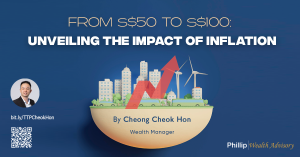The Best of Both Worlds: REIT + ETF = REIT ETF April 23, 2018

What are REITs?
Real Estates Investment Trusts (REITs) are funds that invest in a portfolio of income-generating real estate assets such as shopping malls, offices, industrial estates, hotels, etc.[1] REITs can be classified according to the type of real estates they invest in and the geographic locations they are in:
- Retails REITs (eg. CapitaMall Trust, Frasers Centrepoint Trust)
- Industrial REITs (eg. Ascendas REIT, Mapletree Industrial Trust)
- Office REITs (eg. Frasers Commercial Trust, Keppel REIT)
- Healthcare REITs (eg. Parkway Life REIT , First REIT)
- Hotel & Resort REITs (eg. Frasers Hospitality Trust, Far East Hospitality Trust)
- Residential REITs (eg. Ascott Residence Trust)
(Types of REITs and REIT Fund Managers are not exhaustive)
Many investors might think of buying a physical property (private apartments, shop houses, etc.) when it comes to investing in property. What they might not know is that REITs allow investors to have vested interests in the real estate sector without having to make significant commitment to purchase the property. Majority of the investors may not have the capital required to invest in properties and REITs offer them a cost-effective way to gain exposure to physical property and diversify their investment portfolio.
REITs Investments Vs Real Estate Investments
| REITs | Real Estate | |
| Capital Outlay | Flexible, as low as a few hundred dollars | Capital Intensive and usually requires leveraging |
| Process | Simple, transacted like shares on stock exchanges | Long process from viewing to completion of paperwork |
| Yield | Yes, from dividend income | Yes, from rental income |
| Capital appreciation/depreciation | Capital gain / loss depending on demand & supply on stock exchanges and performance of REITs | Asset appreciation / depreciation depending on supply & demand for properties in the open market |
| Barriers to Entry/Exit | Can be transacted readily on stock exchanges | A need to source for buyers who are willing to match the asking price for the property |
| Price discovery | Prices quoted on exchanges | Need to source for valuations and professional valuators |
Characteristics of REITs
The underlying assets of REITs are professionally managed and income generated from the assets (primarily rental income) are distributed to investors at regular intervals. Thus, REITs are ideal for investors looking for constant dividend pay-out throughout the year (dividend frequency and yield depends on policy of respective REITs).
REITs are transacted on stock exchanges around the world. However, REITs, being similar to equities, are especially susceptible to market risks and non-market risks. For example, Retail REITs’ performance are vulnerable to the economic climate and are positively correlated to the consumers’ spending power (Market Risks). Physical retail malls (underlying assets of Retail REITs) are also facing tough competitions from online retail outlets, which will in turn affect the Retail REITs’ performance (Non-Market Risks).
In addition to the wide variety of different REIT sectors, REITs may also be located in different geographic regions and are vulnerable to the particular political development and fiscal policy of the region. For instance, a fall in interest rate may encourage businesses to borrow more and invest into retail or office space, which will in turn drive up the performance of the respective REITs. Conversely, an increase in interest rate will increase the cost of borrowing and ultimately affect the gearing ratio and performance of REITs.
Political climate, consumers’ trends, fiscal and government policies are constantly unfolding and changing throughout the world. This framework meant that REITs are notably exposed to the changes in their external and internal environment.
5 Advantages of REITs
- Wide variety of REITs available in different geographic locations
- Cost-effective method to gain exposure to real estate industry
- A unique asset class for investors to diversify their investment portfolio
- Stable dividend pay-out and decent dividend yield
- Suitable for investors looking to supplement their passive income
Click here to view “5 Things to Look Out for When Investing in REITs”
A Unique Hybrid: REIT Exchange-Traded Funds (ETFs)
REIT ETFs are open-ended funds listed and traded on stock exchanges. However, unlike traditional REITs, REIT ETFs contain a basket of REITs as its underlying assets and give REIT ETF holders exposure to a basket of REITs rather than a single REIT.
The investment objective of REIT ETFs is to replicate the benchmark index that it is tracking and it adopts a passive indexing strategy. This strategy provides investors with convenience as they do not have to track the performance of each individual REIT.
Dividends garnered from the underlying assets of the REIT ETFs will be distributed to the ETF holders, with the frequency and yield decided by the fund managers of the REIT ETFs.
The first REIT ETF in the world is iShares US Real Estate ETF, IYR, listed on the New York Stock Exchange in June 2000. In Singapore, there are 2 REITs ETFs listed on SGX namely Phillip SGX APAC Dividend Leaders REIT ETF and Nikko Asset Management Asia REIT ETF.
Moreover, investors who wish to diversify into REITs do not have to transact each REIT counter of different sector or region individually and incur high transaction costs in the process. The REIT ETFs offer them a convenient method to gain exposure to multiple sectors and geographic regions with just a single fund holding.
The main purpose of diversification is to reduce risk while enjoying a stable stream of income. The main investment objective of REIT ETFs is to replicate the performance of the benchmark index that the ETF is tracking. REIT ETFs are chosen based on the index benchmark constituents. Investors can simply choose the REIT ETFs objective that best align with their investment strategy and objective.
The REIT ETF fund manager rebalances the holdings of the ETF on behalf of the ETF holders according to the investment objectives of the ETF and index benchmark criteria . Weaker REITs will be replaced by better performing REITs, which will in turn benefit the overall performance of the REIT ETF.
Learn more about Phillip SGX APAC Dividend Leaders REIT ETF and Nikko Asset Management Asia REIT ETF
Lion-Phillip S-REIT ETF
The Lion-Phillip S-REIT ETF is Singapore’s first REIT ETF to comprise purely of 26 high-quality Singapore REITs. This REIT ETF main objective is to track Morningstar® Singapore REIT Yield Focus Index. Criteria for inclusion into this index are:
1) Financial Health
2) Quality
3) Dividend Yield
Hence, investors can gain low-cost access and broad exposure to Singapore real estates through this ETF. Besides allowing investors to diversify their portfolio, this ETF provides regular and sustainable income stream through its semi-annual dividend distribution to investors. There is also potential capital growth for investors when the underlying assets of the ETF grow in value.
Comparison of SGX Listed REIT ETFs:
| Lion-Phillip S-REIT ETF | Phillip APAC SGX REIT ETF | Nikko AM Asia Ex Japan REIT ETF | |
| Number of Holdings | 26 | 30 | 23 |
| Dividend Frequency | Semi-Annual | Semi-Annual | Quarterly |
| Country Allocation | Singapore-100% | Australia – 58.8% Singapore – 29.5% Hong Kong – 11.4% |
Singapore – 60.1% Hong Kong – 21.9% China – 6.9% Malaysia – 5.8% Indonesia – 2.8% Global/Asia – 2.5% |
| Sector Allocation | Retail – 24.2% Industrial – 22.4% Office – 19.4% Diversified – 13.8% Hotel & Resort – 8.2% Healthcare – 5.4% Residential – 3.3% Specialised – 2.3% |
Retail – 47.7% Diversified – 25.8% Industrial – 15.4% Office – 8.7% Residential – 1.1% Hotel & Resort – 1.0% |
Retail – 36.7% Industrial – 20.0% Diversified – 19.1% Office – 16.9% Residential – 2.5% Hotel & Resort – 2.5% Healthcare – 1.4% Cash & Equivalents – 1.0% |
| Top 3 Holdings | Mapletree Commercial Trust – 9.9% CapitaLand Mall Trust – 9.6% Ascendas REIT – 9.5% |
Link REIT – 10.32% Scentre Group -9.79% Westfield Corp – 9.26% |
Ascendas REIT – 10.2% Suntec REIT – 9.8% Link REIT – 9.5% |
| Management Fee | 0.5% | 0.3% | 0.5% |
| Trading Currency | SGD | SGD and USD | SGD |
| Stock Code | CLR | BYI and BYJ | CFA |
Information provided are accurate as of 23 April 2018
Conclusion
Despite sharing several similarities with stocks, REITs are a unique asset class on their own. They offer a cost-effective way for investors to be vested in the properties market and an additional option to diversify their portfolio asset allocation. Nevertheless, investors have to take note of the disadvantages and limitations that come with REITs investments; Susceptibility to market volatility, high gearing ratio and dependence on competency and capability of REITs Fund Managers.
Through the use of REIT ETFs, investors can harness the characteristics of ETF to enhance their exposure into the REITs industry and overcome some of the disadvantages that come with REITs. The diversification aspect of REIT ETFs minimises investors’ risk exposure to a particular REIT’s sector and geographic region. In addition to the convenience offered by REIT ETFs to investors, they also provide investors with a constant dividend pay-out and dividend yield that investors may desire in a financial asset.
For more information on ETFs, please visit https://www.poems.com.sg/products/etf/ or call our Product Specialist at 6531 1246.
Article updated on 23 April 2018
Disclaimer
These commentaries are intended for general circulation. It does not have regard to the specific investment objectives, financial situation and particular needs of any person who may receive this document. Accordingly, no warranty whatsoever is given and no liability whatsoever is accepted for any loss arising whether directly or indirectly as a result of any person acting based on this information. Opinions expressed in these commentaries are subject to change without notice. Investments are subject to investment risks including the possible loss of the principal amount invested. The value of the units and the income from them may fall as well as rise. Past performance figures as well as any projection or forecast used in these commentaries are not necessarily indicative of future or likely performance. Phillip Securities Pte Ltd (PSPL), its directors, connected persons or employees may from time to time have an interest in the financial instruments mentioned in these commentaries. Investors may wish to seek advice from a financial adviser before investing. In the event that investors choose not to seek advice from a financial adviser, they should consider whether the investment is suitable for them.
The information contained in these commentaries has been obtained from public sources which PSPL has no reason to believe are unreliable and any analysis, forecasts, projections, expectations and opinions (collectively the “Research”) contained in these commentaries are based on such information and are expressions of belief only. PSPL has not verified this information and no representation or warranty, express or implied, is made that such information or Research is accurate, complete or verified or should be relied upon as such. Any such information or Research contained in these commentaries are subject to change, and PSPL shall not have any responsibility to maintain the information or Research made available or to supply any corrections, updates or releases in connection therewith. In no event will PSPL be liable for any special, indirect, incidental or consequential damages which may be incurred from the use of the information or Research made available, even if it has been advised of the possibility of such damages. The companies and their employees mentioned in these commentaries cannot be held liable for any errors, inaccuracies and/or omissions howsoever caused. Any opinion or advice herein is made on a general basis and is subject to change without notice. The information provided in these commentaries may contain optimistic statements regarding future events or future financial performance of countries, markets or companies. You must make your own financial assessment of the relevance, accuracy and adequacy of the information provided in these commentaries.
Views and any strategies described in these commentaries may not be suitable for all investors. Opinions expressed herein may differ from the opinions expressed by other units of PSPL or its connected persons and associates. Any reference to or discussion of investment products or commodities in these commentaries is purely for illustrative purposes only and must not be construed as a recommendation, an offer or solicitation for the subscription, purchase or sale of the investment products or commodities mentioned.
About the author
Mr. Joel Lim
ETF Specialist
Joel graduated from Singapore Institute of Management, University of London with a First Class Honours in Business. He was the recipient of SIM University of London’s Top Student Bronze Award in 2017 and was the worldwide examination topper for the “Financial Management” module in 2016. Joel was also commended by University of London for his excellent performance in the 2014 Examinations.
Joel is involved in ETF education, providing trading ideas and support to traders, dealers and fund managers. Joel also works closely with ETF issuers to educate retail investors about new ETFs during the Initial Offering Period.

 Back in Business: The Return of IPOs & Top Traded Counters in March 2024
Back in Business: The Return of IPOs & Top Traded Counters in March 2024  From $50 to $100: Unveiling the Impact of Inflation
From $50 to $100: Unveiling the Impact of Inflation  How to soar higher with Positive Carry!
How to soar higher with Positive Carry!  Why 2024 Offers A Small Window of Opportunity and How to Position Yourself to Capture It
Why 2024 Offers A Small Window of Opportunity and How to Position Yourself to Capture It 









